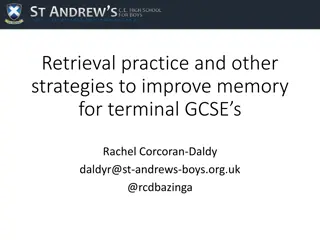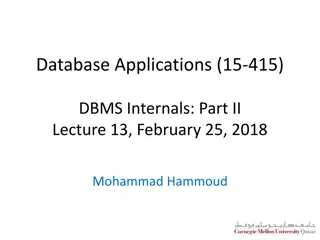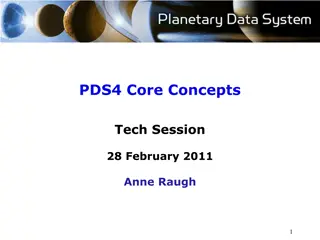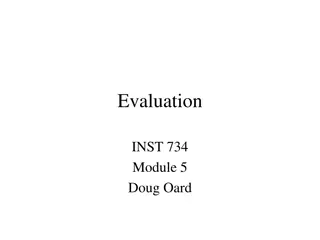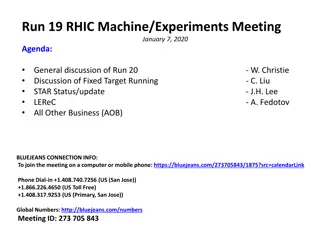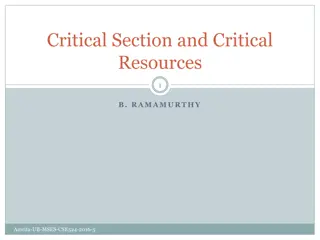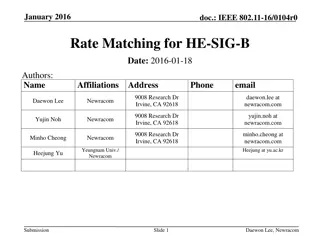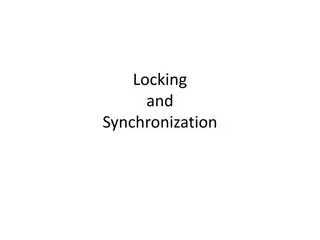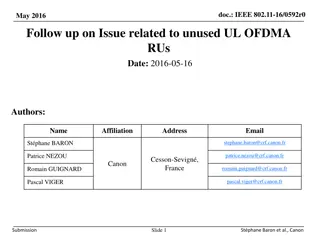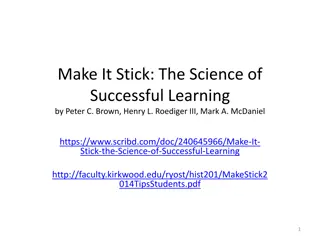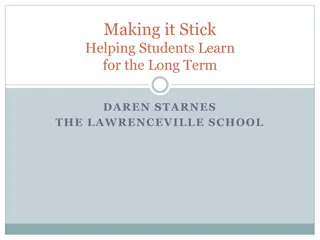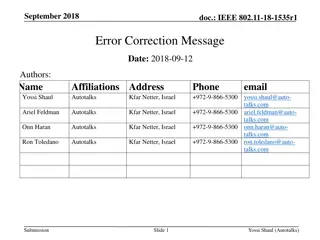Strategies for Improving Memory and Revision Techniques for GCSE Success
Enhance memory and revision skills for GCSE exams with effective strategies like retrieval practice, spaced practice, interleaving, elaboration, and dual coding. Avoid ineffective techniques such as highlighting and cramming. Encourage students to engage in retrieval practice with low-stakes quizzes
5 views • 15 slides
Understanding RAID Technology in DBMS: Redundancy and Performance
This content provides insights into RAID technology, discussing the combination of reliability and performance in managing multiple disks through various RAID levels like RAID 0, RAID 1, RAID 2, RAID 3, RAID 4, and RAID 5. It explores the advantages of RAID, such as data striping, mirroring, bit int
0 views • 61 slides
Enhancing Replay Interface Efficiency in System Debugging
Efforts by researchers at Microsoft Research Asia and MIT focus on enhancing replay interface efficiency for system debugging. The motivation stems from the non-determinism challenges caused by time, user input, network I/O, and thread interleaving. The study observes that only certain parts of a pr
0 views • 26 slides
Understanding PDS4 Core Concepts
Delve into the intricate world of PDS4 Core Concepts, exploring data formats, arrays, tables, interleaving, parsing byte streams, encoding byte streams, and the meticulous structuring of documents, data geometry, and calibration within the PDS4 framework. Discover the principles governing the storag
0 views • 50 slides
Evaluation Fundamentals and Interleaving Techniques in Information Retrieval
Explore the essentials of evaluation in Information Retrieval, covering topics like test collections, ranking, interleaving, and user studies. Understand batch and interleaved evaluation methods, user interaction feedback, and the motivation behind practical online retrieval evaluation. Dive into ba
0 views • 15 slides
Challenges and Innovations in CXL 3.0 Dynamic Capacity Devices
Exploring the intricacies of CXL 3.0 Dynamic Capacity Devices presented at the LPC CXL micro conference 2023, focusing on asynchronous memory operations, partial extents, interleaving flow challenges, and memory sharing. The discussion delves into the dynamic capacity feature allowing memory changes
0 views • 17 slides
Summary and Updates from RHIC Machine Experiments Meeting
General discussion and updates from the Run 19 RHIC Machine Experiments Meeting held on January 7, 2020, including discussions on Run 20, Fixed Target Running for STAR, LEReC status updates, and other business matters. Key points covered include the schedule assumptions, interleaving LEReC commissio
0 views • 10 slides
Effective Revision Timetable and Healthy Exam Season Habits
Learn about creating an effective revision timetable with principles like schema, interleaving, spacing, and metacognition. Stay healthy during exam season by incorporating breaks, physical activity, nutritious meals, and sufficient sleep. Avoid unproductive revision methods like repeated answering
0 views • 10 slides
Managing Critical Resources in Concurrent Processes
Concurrent processes can enhance performance but require careful handling of critical resources to prevent inconsistency. Utilizing semaphores for mutual exclusion and synchronization can help control access to shared resources. This article discusses the principles of concurrency, issues with inter
0 views • 18 slides
January 2016 IEEE 802.11-16/0104r0: Rate Matching for HE-SIG-B
The document from January 2016 focuses on rate matching for HE-SIG-B in IEEE 802.11-16/0104r0 standard. It delves into the encoding/decoding structure, example of SIG-B with code-rate, MCS table, proposed encoding method for HE-SIG-B, and the structure of HE-SIG-B per-STA information field. The cont
0 views • 10 slides
Understanding Locking and Synchronization in Multithreaded Environments
Exploring the concepts of locking and synchronization in the context of shared resources in multithreaded environments. Covering topics such as thread cooperation, coordination of access to shared variables, and the importance of synchronization mechanisms for controlling execution interleaving. Exa
0 views • 41 slides
Enhancing Durable Learning Strategies for Effective Education
Explore the challenges and evidence-based strategies to promote durable learning highlighted in a symposium led by Amanda Maknyik, MEd Manager at Durham College. Learn about the importance of motivation, sustained attention, and relevance in achieving lasting learning outcomes. Discover how spaced p
0 views • 20 slides
IEEE 802.11-16/0592r0: Follow-up on Unused UL OFDMA RUs
In May 2016, a presentation by Stéphane Baron and team from Canon addressed the issue of unused Random Units (RUs) in UL OFDMA transmission in IEEE 802.11 standards. The presentation covers the consequences, simulation results showing significant unused RUs, and a proposed solution of random RUs in
0 views • 8 slides
Understanding Atomics and Parallelism in Programming
Explore the world of atomics, parallelism, memory access optimizations, and sequential consistency in programming. Dive into concepts such as races in multithreading, cache optimizations, and the importance of memory access order before and after compiler optimizations. Witness live demos showcasing
0 views • 46 slides
Effective Study Strategies for Successful Learning
Effective study strategies outlined in the book "Make It Stick: The Science of Successful Learning" emphasize the importance of self-quizzing, spacing out retrieval practice, and interleaving the study of different problem types. By taking charge of their learning and embracing challenges, students
0 views • 10 slides
Effective Learning Strategies for Students
Explore insightful research-backed strategies to enhance students' learning and retention, such as spaced practice, interleaving techniques, and active studying methods. Gain valuable advice for both teachers and students on optimizing homework assignments and study habits to foster long-term academ
0 views • 8 slides
Simplifying Bug Finding in Concurrent Programs
Handling concurrency in software development poses challenges due to state space explosion. This work discusses how reduced interleaving instances and concurrent hardware can make bug finding easier by analyzing smaller independent tasks in parallel. Strategies for task competition and model checkin
0 views • 26 slides
IEEE 802.11-18-1535r1 Error Correction Method for High Utilization Networks
This document discusses the implementation of a dedicated error correction packet in IEEE 802.11-18-1535r1 for improving error corrections in high utilization networks. The method involves sending parity bytes immediately after the original data packet, separated by Short Interframe Space (SIFS). By
0 views • 15 slides
